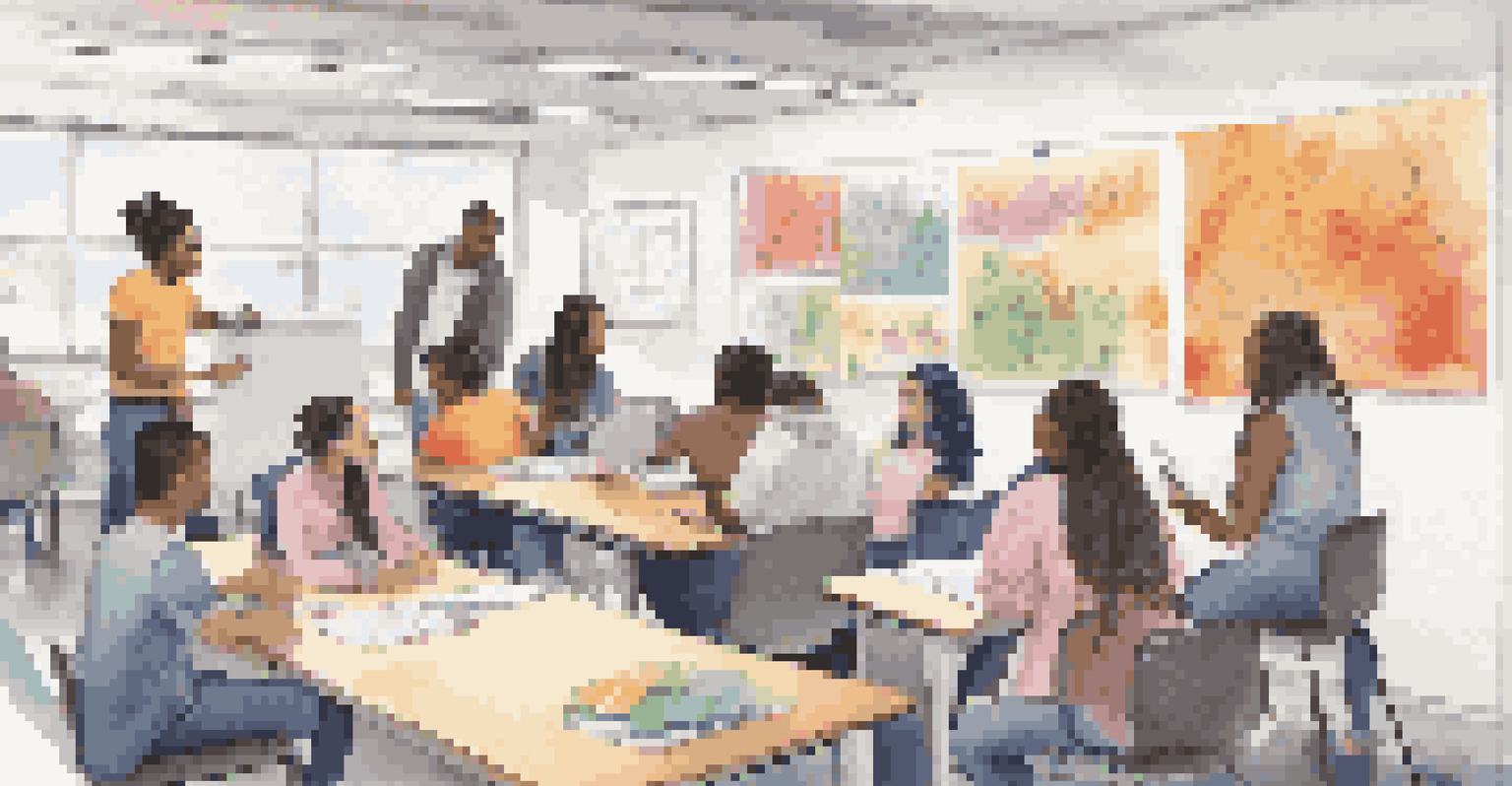Transforming Academic Knowledge into Work Experience

Understanding the Gap Between Theory and Practice
In academia, we often find ourselves deep in theories and concepts that can feel worlds away from real-world applications. This gap can be daunting for students entering the workforce, as they wonder how their classroom learning translates into job skills. Recognizing this disconnect is the first step toward bridging it, as it encourages proactive strategies to gain practical experience.
The only source of knowledge is experience.
For example, a student studying psychology may excel in understanding theories of behavior but might struggle to apply this knowledge in a clinical setting. It’s not enough to know the theory; one must learn how to engage with real clients and situations. This realization pushes students to seek out internships or volunteer opportunities, which are invaluable for applying their academic insights.
By acknowledging the gap between theory and practice, students can adopt a more holistic approach to their education. They can actively seek experiences that complement their learning, turning abstract knowledge into concrete skills that employers value.
Identifying Relevant Experiences in Your Field
Finding experiences that align with your academic background is crucial for transforming knowledge into practical skills. Look for internships, part-time jobs, or volunteer opportunities that tie directly to your field of study. For instance, a marketing student might gain experience in a social media internship, which allows them to apply classroom concepts in a real-world setting.

Networking can also play a pivotal role in discovering these opportunities. Engaging with professors, alumni, or industry professionals can lead to valuable connections and insights about available positions. These relationships can often provide leads on experiences that are not widely advertised.
Bridging Theory and Practice
Students can enhance their job readiness by actively seeking internships and practical experiences that apply theoretical knowledge.
Remember, even unrelated jobs can offer transferable skills. Working in customer service can hone your communication and problem-solving abilities, which are essential in any profession. The key is to remain open-minded and proactive in seeking opportunities that enhance your learning.
Leveraging Internships for Skill Development
Internships are a fantastic way to bridge the gap between academic knowledge and real-world experience. They provide students with a structured environment to apply theoretical concepts, gain new skills, and understand workplace dynamics. For example, a finance intern may use classroom theories to analyze financial data, making the learning process more tangible.
Learning is a treasure that will follow its owner everywhere.
Moreover, internships allow for mentorship opportunities. Working closely with professionals can provide insights that textbooks can't offer. Mentors can guide interns through challenges and help them develop essential soft skills, like teamwork and adaptability, which are crucial in today’s job market.
It’s important to approach internships with a learning mindset. Set specific goals for what you want to achieve during your internship, and actively seek feedback. This proactive approach not only enhances your skill set but also demonstrates to future employers your commitment to professional growth.
Utilizing Projects to Showcase Your Knowledge
Projects during your academic career can serve as excellent platforms to demonstrate your knowledge and skills. Whether it's a group project, thesis, or independent study, these experiences can be highlighted in your resume to show how you've applied your learning. For instance, a computer science student who developed an app as a class project can showcase this during job interviews.
Additionally, consider sharing these projects on platforms like GitHub or personal websites. This not only enhances your online presence but also provides tangible evidence of your capabilities to potential employers. A well-documented project can speak volumes about your technical skills and creativity.
Networking for Opportunities
Building a professional network through events and connections can lead to hidden job opportunities and valuable insights.
In essence, leveraging academic projects can be a key differentiator in a competitive job market. They reflect your initiative, problem-solving skills, and ability to apply theoretical knowledge in practical scenarios.
Building a Professional Network for Future Success
Networking is an essential part of transforming academic knowledge into work experience. Building relationships with peers, professors, and industry professionals can open doors to opportunities that might not be advertised. For instance, a casual conversation at a university event could lead to a job offer or internship.
Joining professional organizations or attending industry conferences can also enhance your network. These events provide a platform to meet like-minded individuals who share your interests and aspirations. Engaging in discussions can lead to valuable insights and potential collaborations that can enrich your learning experience.
Remember, networking is a two-way street. Be genuine and offer assistance to others when possible. This not only strengthens your connections but also builds a reputation as a valuable resource in your field.
Gaining Experience Through Volunteer Work
Volunteering is a powerful way to gain practical experience while making a positive impact. Many organizations welcome volunteers and offer opportunities to apply your academic skills in real-world settings. For instance, a student studying environmental science might volunteer with a local non-profit focused on sustainability, gaining hands-on experience in their field.
Moreover, volunteering can broaden your skill set beyond your academic focus. You may find yourself taking on roles that require leadership, communication, or project management skills. These experiences can enhance your resume and demonstrate to employers that you are proactive and willing to learn.
The Power of Reflection
Reflecting on experiences helps solidify learning and informs future career choices, making it a crucial step in professional development.
Ultimately, volunteering not only fills gaps in your experience but also enriches your personal growth. It allows you to connect with your community, develop empathy, and gain insights that can shape your future career path.
Reflecting on Experiences to Enhance Learning
Reflection is a critical component of transforming academic knowledge into work experience. Taking the time to assess what you've learned from internships, projects, or volunteer work helps solidify your understanding and identify areas for improvement. Keeping a reflective journal can be an effective way to track your growth and insights.
For example, after completing an internship, consider what tasks you enjoyed the most and which skills you developed. This self-assessment can inform your career choices and guide your future learning. It also prepares you for interviews, as you can articulate your experiences and the lessons learned.

In summary, reflection fosters a deeper connection between academic knowledge and practical application. By understanding your experiences, you can more effectively navigate your career path and make informed decisions about your professional future.